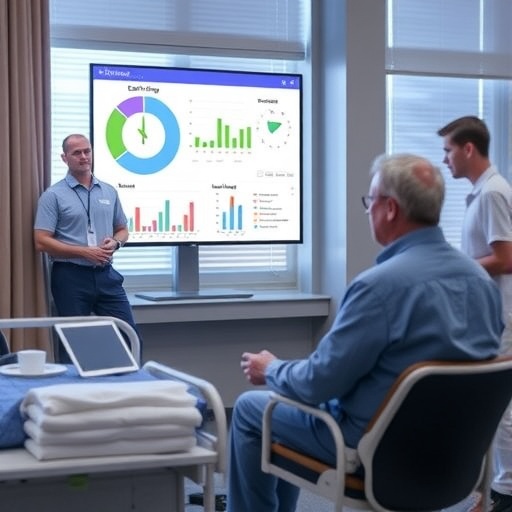In recent years, the understanding and detection of delirium in hospitalized older patients have gained significant attention within the medical community. This acute confusional state, characterized by rapid-onset cognitive dysfunction, can profoundly impact patient outcomes. Despite its prevalence, especially within geriatric populations, delirium often goes underdiagnosed, contributing to prolonged hospital stays and increased morbidity and mortality.
A pioneering study led by Trabert et al. presents an innovative approach to enhancing delirium detection through a single, straightforward question. The study investigates the efficacy of this method in tracking cognitive disturbances among older hospitalized patients, illuminating a potential shift in clinical practices for delirium identification. The simplicity and directness of the proposed question aim to address the often convoluted clinical assessments currently employed in hospitals.
Delirium poses a complex challenge for healthcare providers, not least due to its multifactorial etiology. Preexisting cognitive impairment, infections, medication side effects, and metabolic imbalances often intertwine to trigger delirium episodes in vulnerable older adults. The conventional diagnostic methods typically involve comprehensive assessments that can be time-consuming and may fail to recognize subtle cognitive changes early. This study’s novel inquiry seeks to streamline that process.
The focal question proposed by the researchers is designed to elicit immediate responses that can gauge an individual’s cognitive state swiftly. This method not only enhances efficiency but also aligns well with the busy dynamics of hospital settings, where time is often of the essence. With healthcare professionals inundated with responsibilities, a tool that allows for rapid screening is invaluable.
Mental status examinations have traditionally relied upon a battery of cognitive tests which can be intimidating for patients, often leading to hesitance in providing accurate responses. The single question approach alleviates this pressure, permitting more candid admissions of cognitive difficulties. Initial findings from Trabert et al. indicate that patients respond more freely to a simple, relatable inquiry than to a series of detached cognitive tests.
The implications of this research are profound. If widely adopted, this single question tool could revolutionize delirium detection protocols within hospitals, ultimately leading to better patient outcomes. Early identification of delirium enables timely interventions which can shorten hospitalization periods, reduce the risk of further complications, and enhance overall patient wellbeing. The potential for reducing healthcare burdens cannot be overstated in an era where hospital resources are stretched thin.
Moreover, the study’s findings underscore the significance of raising awareness about delirium among healthcare professionals and the public alike. Education about the signs and consequences of delirium is critical in building a proactive approach towards its management. The integration of this single question into routine assessments could serve as a powerful reminder for clinicians to remain vigilant about cognitive health in aging patients.
As healthcare systems increasingly prioritize patient-centered approaches, recognizing the value of direct communication becomes crucial. This study emphasizes that effective delirium screening should not only focus on clinical efficiency but also on the patient experience and comfort. The human aspect of care—understanding the patient’s voice—should remain at the forefront of clinical practice.
In assessing the broader implications of delirium beyond immediate clinical outcomes, it is essential to consider the emotional and psychological toll it can take on both patients and their families. Delirium can lead to heightened anxiety, confusion, and frustration for those affected. By simplifying the detection process, not only do we aid in rapid clinical actions, but we also facilitate a gentler transition for patients from confusion back to clarity.
The inclusion of the single question approach in routine screenings offers the opportunity to generate rich data on delirium trends and correlations. As hospitals adopt this method, vast datasets could emerge, leading to further research opportunities to refine and innovate delirium management. Such data could inform best practices, influence policy changes, and ultimately guide future research endeavors.
However, while the initial results are promising, the study’s authors emphasize the need for further validation across diverse patient populations and healthcare settings. Replicating findings in various clinical environments is critical to confirming the reliability and effectiveness of this modus operandi. Only through comprehensive research can we ascertain the true impact of a single question on delirium detection.
In summary, the exploration of a single question as a tool for delirium detection propels forward a significant leap in geriatric medicine. The capacity to enhance clinical efficiency, improve patient outcomes, and foster better communication between healthcare providers and patients establishes this method as a viable instrument for change. The future of delirium detection may well depend on embracing such innovative, simplistically powerful inquiries.
As the study by Trabert et al. continues to ripple through healthcare discourse, it opens dialogues about innovation and patient care approaches. The quest to refine delirium identification and management is ongoing, but the insights gleaned from this research present a tantalizing glimpse of what lies ahead in the realm of geriatrics. The introduction of a singular, potent inquiry into the assessments of delirium is but the beginning of a necessary evolution in our understanding and treatment of cognitive disturbances in older adults.
In the context of today’s fast-paced medical landscape, this research heralds a new era—one where simplicity meets clinical necessity—and emphasizes the importance of advanced methodologies that align with human experience and clinical practice in a harmonious balance.
Subject of Research: Delirium detection in hospitalized older patients
Article Title: The Single Question in Delirium as a suitable tool to improve delirium detection in hospitalized older patients.
Article References: Trabert, J., Smolka, V., Caudal, M. et al. The Single Question in Delirium as a suitable tool to improve delirium detection in hospitalized older patients. Eur Geriatr Med (2025). https://doi.org/10.1007/s41999-025-01314-9
Image Credits: AI Generated
DOI: https://doi.org/10.1007/s41999-025-01314-9
Keywords: Delirium, Geriatrics, Cognitive Health, Patient Outcomes, Healthcare Innovation




